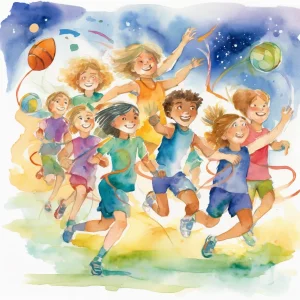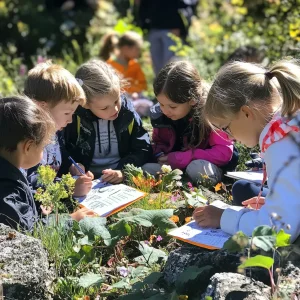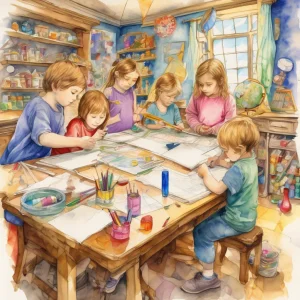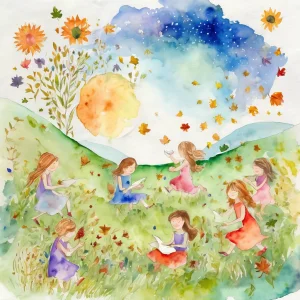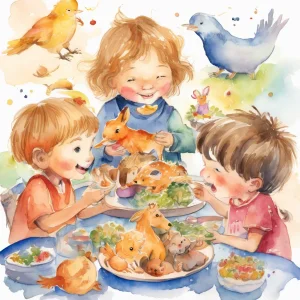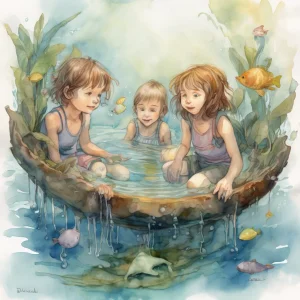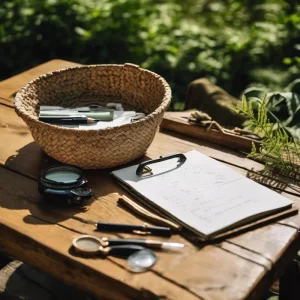Activity
Similar Activities
Harmony of Motion: Musical Sports Relay Race
Children’s Age: 6–8 years
Activity Duration: 15 – 30 minutes
The "Musical Sports Relay Race" activity fosters teamwork, cooperation, and sportsmanship in children through an exciting outdoor game blending sports and music elements. Kids will…
Activity Duration: 15 – 30 minutes
Nature Quest: Explore, Learn, and Respect
Children’s Age: 10–15 years
Activity Duration: 0.5 – 1 hours
The Nature Scavenger Hunt activity is designed to help children aged 11 to 15 develop morals, academic abilities, and a love for nature. Prepare by gathering supplies like lists, p…
Activity Duration: 0.5 – 1 hours
Whispering Leaves: A Nature Dance Tale
Children’s Age: 6–10 years
Activity Duration: 20 – 30 minutes
Explore the "Nature Dance Story Circle" activity for children aged 6 to 10, focusing on communication, ecology, and values. Create a safe, spacious setting with a blanket and natur…
Activity Duration: 20 – 30 minutes
Enchanted Puzzle Quest: Teamwork Puzzle Challenge
Children’s Age: 7–9 years
Activity Duration: 40 – 45 minutes
The "Teamwork Puzzle Challenge" activity is designed to boost moral development, teamwork, problem-solving, and communication skills in children. You'll need age-appropriate puzzle…
Activity Duration: 40 – 45 minutes
Imaginary Adventures: Mini Bowling Feelings Story Game
Children’s Age: 2–5 years
Activity Duration: 10 minutes
An engaging activity promoting sensory development, creativity, reading, and storytelling.
Activity Duration: 10 minutes
Nature-Inspired Drawing Activity
Children’s Age: 8–9 years
Activity Duration: 10 – 25 minutes
An outdoor activity where children draw natural elements to foster creativity and ecological awareness.
Activity Duration: 10 – 25 minutes
Ecosystem Adventure Board Game - Nature's Quest
Children’s Age: 7–9 years
Activity Duration: 10 – 25 minutes
An interactive board game where children explore and learn about ecosystems through challenges and tasks.
Activity Duration: 10 – 25 minutes
Enchanted Measurement Adventures: Measuring Real-World Objects Scavenger Hunt
Children’s Age: 5–10 years
Activity Duration: 10 – 20 minutes
An educational activity engaging children in measuring real-world objects through a fun scavenger hunt.
Activity Duration: 10 – 20 minutes
Whispers of the Seasons: Seasonal Collage Exploration
Children’s Age: 5–6 years
Activity Duration: 10 minutes
Engaging activity where children create collages representing different seasons.
Activity Duration: 10 minutes
Animal Feast Adventure: A Whimsical Feeding Frenzy
Children’s Age: 5–8 years
Activity Duration: 10 – 25 minutes
An interactive activity where children feed toy animals with pretend food, promoting communication skills and adaptive development.
Activity Duration: 10 – 25 minutes
Nature's Objects: Exploring Buoyancy Adventure
Children’s Age: 6–7 years
Activity Duration: 10 minutes
An engaging hands-on activity for children aged 6-7 to explore buoyancy with natural objects.
Activity Duration: 10 minutes
Musical Straw Pan Flute Symphony Adventure
Children’s Age: 6–9 years
Activity Duration: 10 minutes
Create a homemade pan flute using plastic straws to explore music and physics concepts.
Activity Duration: 10 minutes



